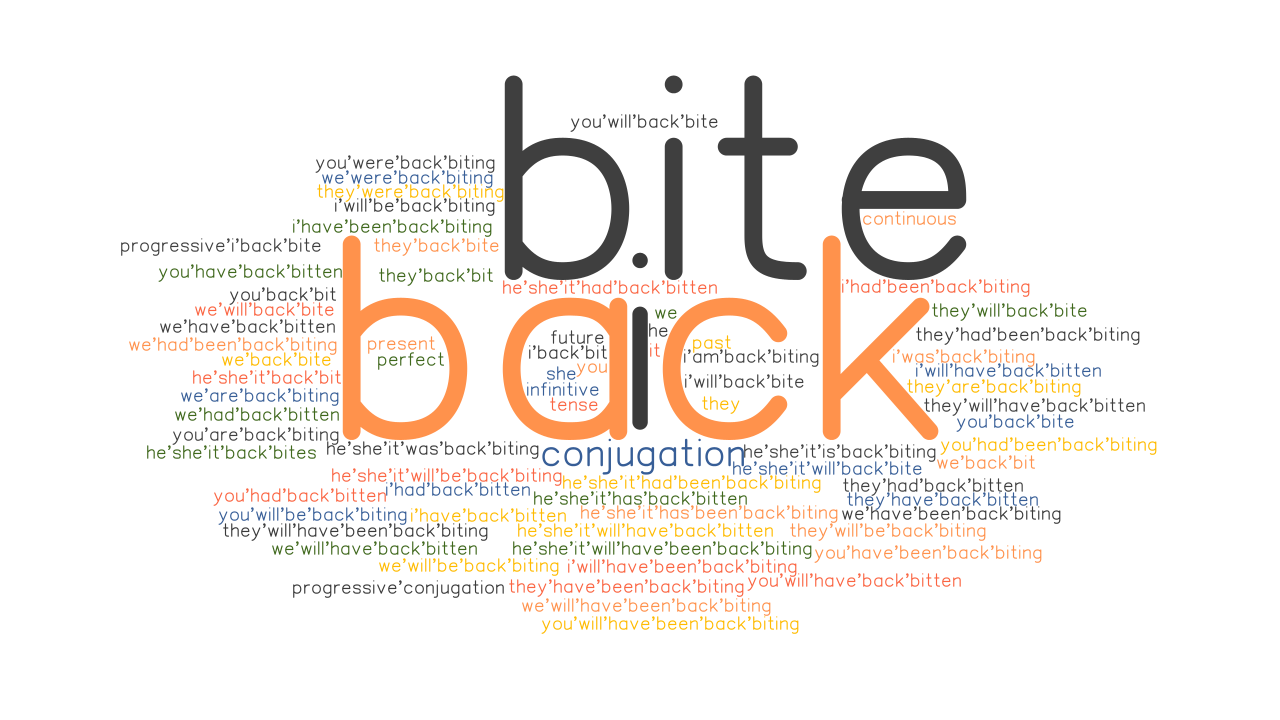
Backbite Past Tense Verb Forms, Conjugate BACKBITE
Past participle bitten Model : bite Auxiliary : have, be Other forms: bite oneself / not bite Contractions Advertising Indicative Present I bite you bite he/she/it bites we bite you bite they bite Preterite I bit you bit he/she/it bit we bit you bit they bit Present continuous I am biting you are biting he/she/it is biting we are biting
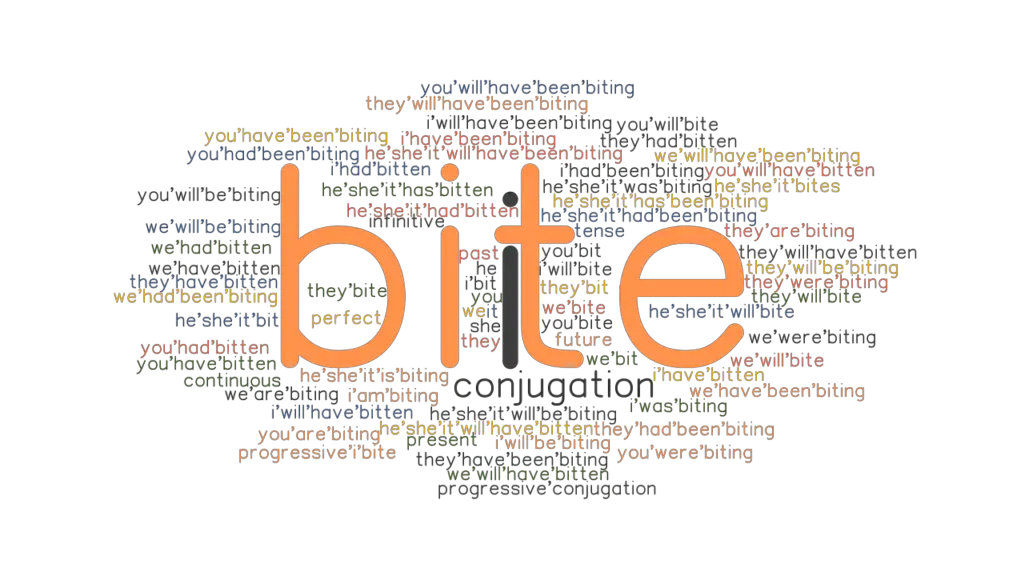
Bite Past Tense Verb Forms, Conjugate BITE
Bite in Past Perfect Tense. Singular. Plural. I had bitten. We had bitten. You had bitten. You had bitten. He/She/It had bitten. They had bitten.

Bite V1 V2 V3 V4 V5 , Past Tense, Past Participle Form of Bite EnglishAwesome
The Verb "Bite" in English Conjugation of "To Bite" The verb "bite" is an irregular verb. (This means that "bite" does not form its simple past tense or its past participle by adding "-ed" or "-d" to the base form.) The Five Forms of "To Bite" "To Bite" in All the Tenses
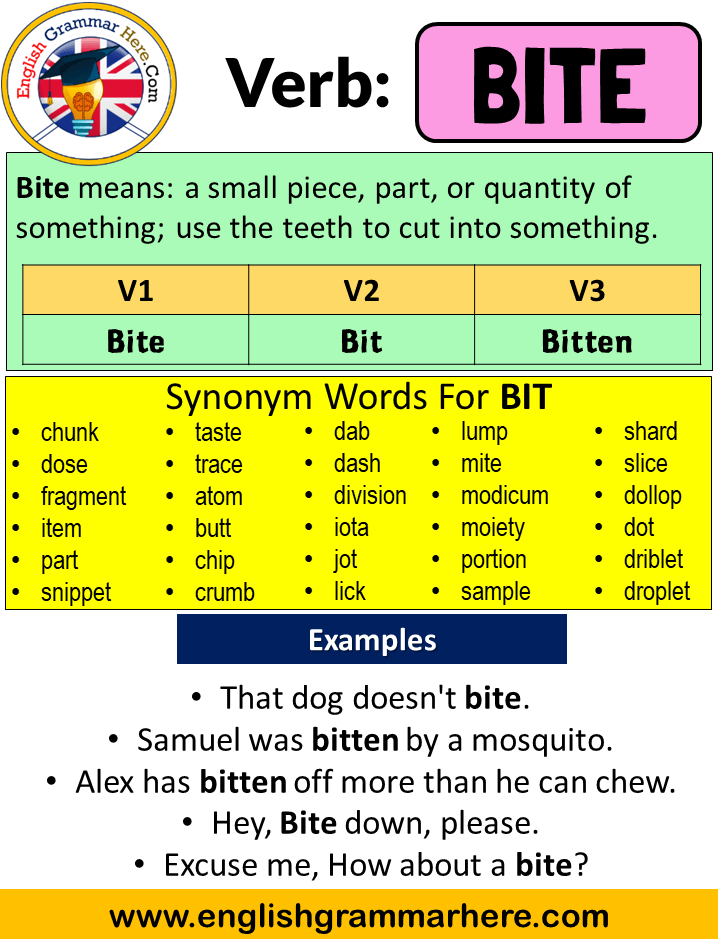
Bite Past Simple, Simple Past Tense of Bite Past Participle, V1 V2 V3 Form Of Bite English
What is the past tense of the word "bite" The past tense (past participle) form of "bite" is "bit." The infinitive of the word form is "bite." The present participle form is "biting." The past tense form is "bit" and past participle form is "bitten." Understanding verb tenses The general grammar rules that govern past tenses are as follows.

Past Tense Of Bite, Past Participle Form of Bite, Bite Bit Bitten V1 V2 V3 Past Ten… Good
Bite is an irregular verb (i.e., it doesn't end in -ed in its past verb conjugations). Bit is the simple past tense of bite. Bitten is the past participle form of bite. 12 verb tenses of ' bite ' 1. To bite is the present tense: Do you want a bite of my sandwich? 2. Bites is third-person present singular: The dog bites the toy. 3.

Bite past tense past tense of bite
bit past tense of bite is bit. Bite verb forms Conjugation of Bite Simple / Indefinite Present Tense He/She/It bites . I bite. You/We/They bite. Present Continuous Tense He/She/It is biting. I am biting. You/We/They are biting. Present Perfect Tense He/She/It has bitten. I have bitten. You/We/They have bitten. Present Perfect Continuous Tense
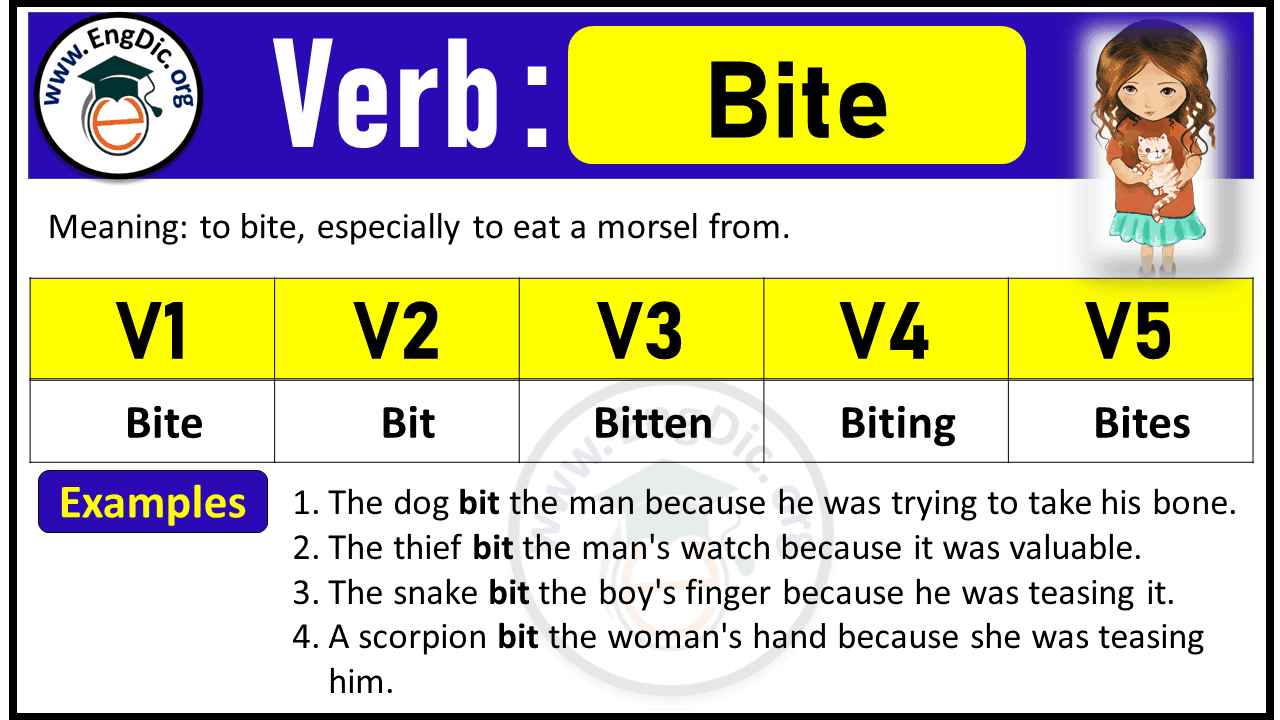
BITE past tense Archives EngDic
The bite past tense is "bit". The bite verb is classified as an irregular form, so it doesn't follow the rule of adding -ed after the verb's basic form. After remembering the past tense of bite, you continue to pocket past participle bite - bitten, and other bite verb forms. Simple Present. He/She/It bites. I/You/We/They bite. Present.
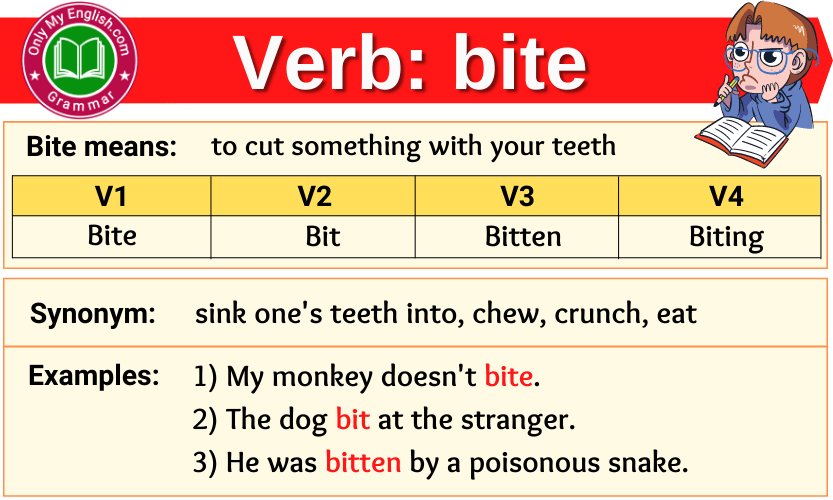
Bite Verb Forms Past Tense, Past Participle & V1V2V3 »
Irregular Verbs List Definition: To Bite Irregular verb: To Bite Verb conjugation: Bite - Bit - Bitten Meaning of 'To Bite' To cut or hold with teeth Conjugation of verb 'Bite' Irregular Verbs Following a Similar Pattern Verbs like: Subscribe to Ad-Free Browsing Enjoy a seamless learning experience without interruptions from advertisements.

Conjugation Bite 🔸 Verb in all tenses and forms Conjugate in past, present and future
past participle: (to) bite biting bi tten definition in Spanish in French in Italian Indicative Perfect tenses Continuous (progressive) and emphatic tenses Compound continuous (progressive) tenses Conditional Imperative Subjunctive *Blue letters in conjugations are irregular forms. ( example)

Bite Past Tense, Present and Future Conjugations, Bite V1 V2 V3 Past tense, Simple past tense
The past tense of "bite" is "bit." It is used to indicate that the action of biting happened in the past. For example: Yesterday, I bit into a juicy apple. The dog bit my hand when I tried to pet him. He had bitten off more than he could chew when he took on that project. She bit her lip nervously during the interview.
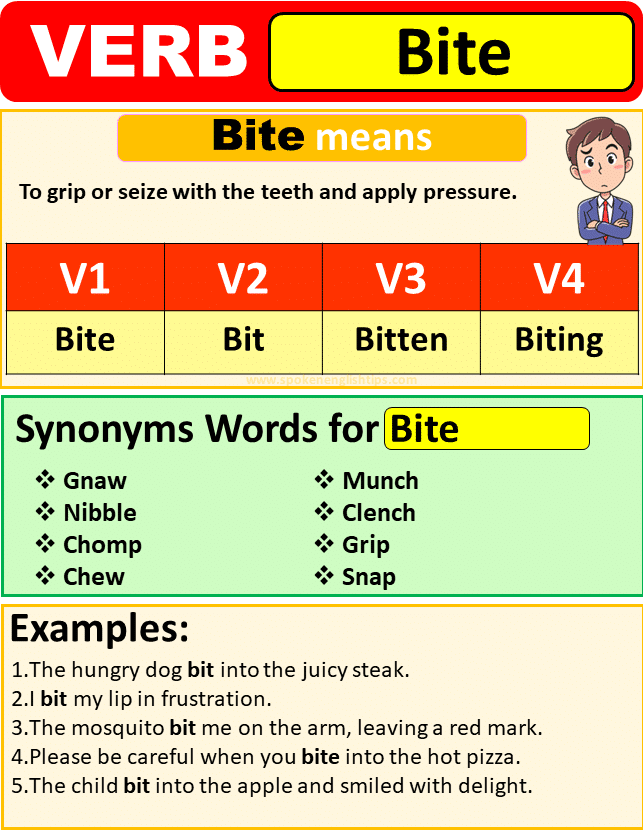
Bite Verb Forms Past Tense of Bite & Past Participle Spoken English Tips
Learn the three forms of the English verb 'bite'. the first form (V1) is 'bite' used in present simple and future simple tenses. the second form (V2) is 'bit', 'bit' used in past simple tense. the third form (V3) is 'bit', 'bitten' used in present perfect and past perfect tenses.
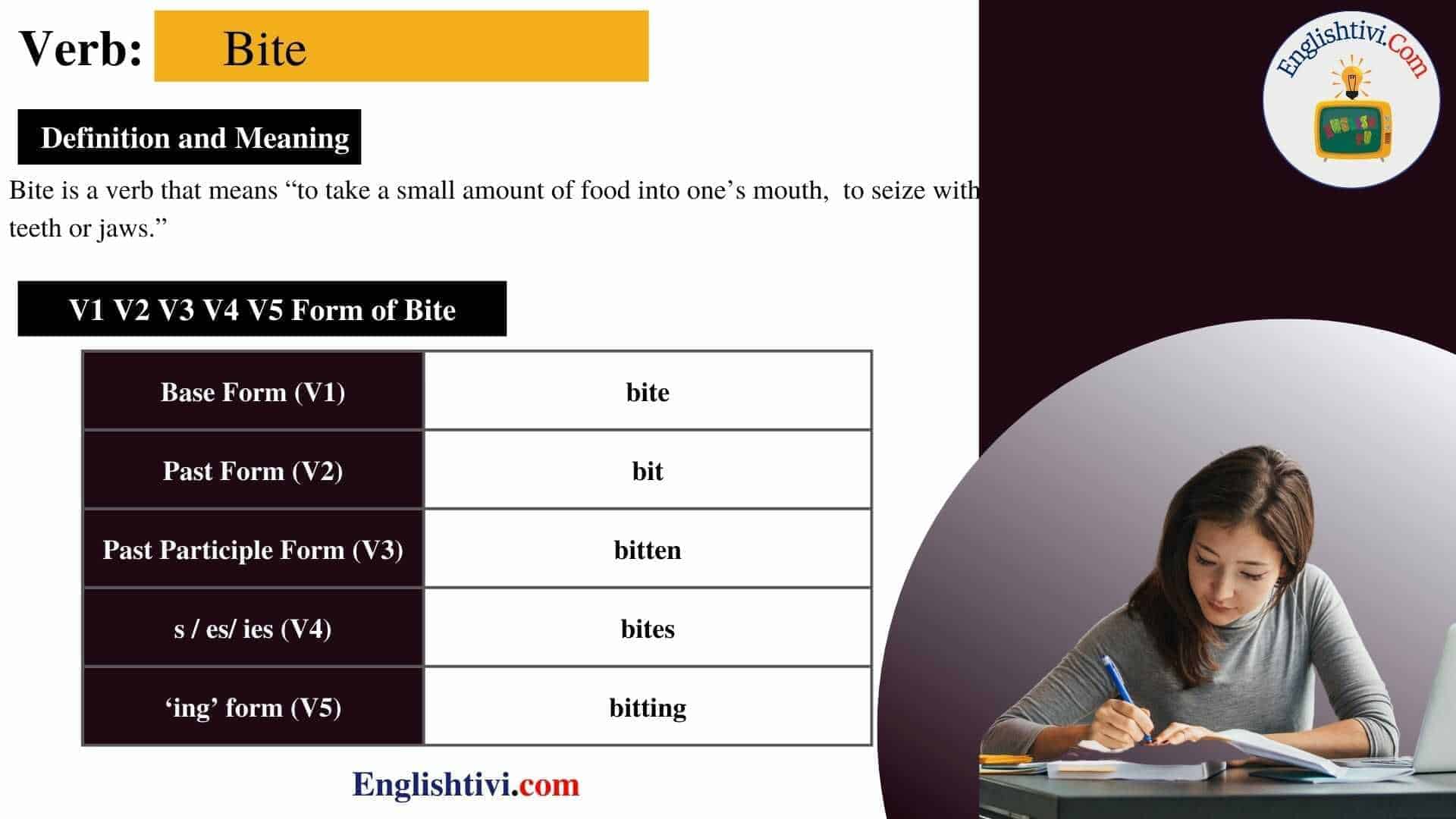
Bite V1 V2 V3 V4 V5 Base Form, Past Simple, Past Participle Form of Bite Englishtivi
The present participle form is "biting." The past tense form is "bit" and past participle form is "bitten." To learn how to use these words, refer to the sentence examples provided below. Sentence examples for past tense of "bite" Infinitive: I bite into the apple to eat. Present participle: I am biting into the apple to eat.

Bite past tense past tense of bite
"Bit" is the default past tense when referring to a single, completed action. "Bitten" is necessary when forming the present perfect (have/has bitten) or past perfect (had bitten) tenses. In addition to being influenced by tense, the choice between "bit" and "bitten" can be determined by whether the action is standalone or ongoing.

Past Tense of BITE in English + Example sentence Learn English Grammar YouTube
The past tense of BITE is BIT. Pronunciation of BIT. UK: / bɪt / --- US: / bɪt / You can hear the pronunciation in the video. Example sentences with BIT. The dog bit the postman. She bit her lower lip. Next learning activities. See our List of past tense irregular verbs in English. Watch our video about 101 Irregular Past Tense Verbs in English.

Past Tense of Bite Bite Present, Past, and Past participle Forms Grammar Quiz
verb uk / baɪt / us past tense bit | past participle bitten bite verb (TEETH) Add to word list B1 to cut something using your teeth: She bit into an apple. He bites his fingernails. He was bitten by a dog. Fewer examples I bit into the pie and a piece of my tooth fell off. Ow! I've just bitten my tongue. He'd already bitten into the apple.

Past Tense of BITE, Present, Future and Participle form
'to bite' conjugation - English verbs conjugated in all tenses with the bab.la verb conjugator. bab.la - Online dictionaries, vocabulary, conjugation, grammar. share person; outlined_flag arrow. Past perfect continuous. I. had been biting. you. had been biting. he/she/it. had been biting. we.